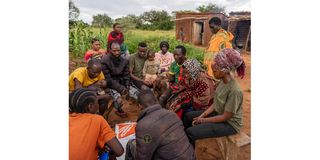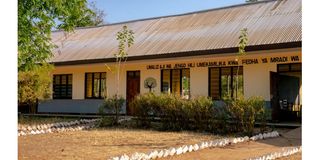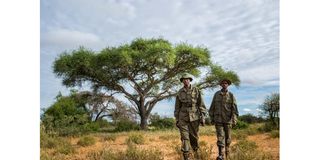Empowering Indigenous Communities for Collaborative Prosperity amid COP28 Discussions

Hadza overlooking the forested valley at the Yaeda - Eyasi Landscape
In the relentless pursuit of positive change and financial empowerment for its citizens, the Government of Tanzania has strategically forged synergies with both local and global institutions. These collaborations aim to unleash income-generating potentials from various activities, with Carbon Tanzania standing out as a beacon of transformative impact, particularly for Indigenous communities.
Amidst these collaborations, the ongoing COP28 summit in Dubai has brought global leaders together to deliberate on crucial strategies for tackling climate change. The discussions at COP28 underscore the urgency of finding innovative solutions, especially those that involve and benefit Indigenous Peoples and local communities as stewards of nature.
Isack Bryson, Yaeda-Eyasi Landscape Project Manager, shares his sentiments on a session at COP28: "COP28 is highly addressed almost everywhere and has brought huge hope to me and my community even before I came here today. We hope that through shared climate concerns, real action will soon be delivered to the world for better livelihoods and a more liveable climate."
Carbon Tanzania, a local company, plays a pivotal role in elevating the economic status of rural communities through the sustainable management of forests and biodiversity. The heart of their projects lies in generating forest-based carbon credits, a unique avenue that enables local resource owners, particularly Indigenous communities, to earn revenues from safeguarding their natural resources.
As the world grapples with the pressing challenges of climate change, the COP28 panel emphasizes the importance of working with Indigenous Peoples and local communities when developing projects that generate biodiversity and nature credits. Carbon Tanzania's initiatives align seamlessly with this perspective, presenting a collaborative model that not only addresses ecological challenges but also recognizes and empowers Indigenous communities.

The Indigenous People and Local Communities of the Yaeda - Eyasi Landscape Project
A Closer Look at Carbon Tanzania's Initiatives
The Yaeda-Eyasi Landscapes project, established in 2012, is a testament to the tangible benefits enjoyed by Indigenous communities. Focused on protecting the forested ancestral homeland of the Hadza hunter-gatherers and Datooga pastoralists, the project expanded in 2021, resulting in increased carbon revenue. This, in turn, empowered these communities to employ additional staff to protect their threatened forests.
A deeper dive into the Yaeda Valley Project reveals that over 137,000 trees stand tall, serving as living monuments to collaborative efforts. These trees act as a bulwark against deforestation, symbolizing the resilience of the Hadza and Datooga communities. With over $546,912 USD generated from carbon credits, the Yaeda Valley has become a catalyst for profound changes in education, healthcare, and overall community well-being.

Classrooms built at the Ntakata Mountains Project through carbon revenue
Fees paid for the education of 42 secondary students, support for 558 primary school children, and assistance for five university students all find roots in the revenue from nature credits. A total of 126 Village Game Scouts (VGS), including 18 female VGS, are now custodians of these lands, trained in natural resource protection and monitoring protocols. Beyond the monetary benefits, the Yaeda Valley experiences positive changes in its localized microclimate, attributed to the project's efforts.
Regina Safari, Hadza community coordinator, shares her perspective: "Furthermore, the carbon revenues generated from protecting the forest have improved access to education for many in Domanga Village, including me. This process is working here on the ground. I urge companies buying carbon credits to continue, or even to increase their purchases. This finance is crucial to the success of the project and for the benefits provided to individuals and communities to continue. I thank you and leave with the words: no forest, no life."
The Makame Savannah project, initiated in 2016, actively engages with the Maasai to conserve critical wildlife habitat. In 2022, the project's impact rippled through improved access to education, including the construction of a girls' dormitory and the payment of fees for over 100 students at various universities across the country. The benefits are not just monetary; they extend to breaking traditional barriers and empowering the community.
Supuk Olekao, Makame WMA Manager, reflects on the transformative impact: “We set up a community conservation area, or Wildlife Management Area (WMA) in 2009 to stop the invasion of our land and its deforestation by nearby subsistence agriculturalists. However, the WMA management authority was unable to put it into practice because of a lack of finance. We had the organization, the ideas, and the people, but not the resources to really protect our land and our forests. The financial revenues from the carbon credits we now earn from protecting our forests in the way we always have mean that we now have the resources to ensure our land is not invaded and our forests stay standing.”
Safeguarding Wildlife Habitat through Community Action
The Ntakata Mountains project reveals a narrative of community-led conservation with tangible impacts. The project area is 216,000 ha and within that is over 11,000 ha of High-quality habitat suitable for endangered eastern chimpanzee, the project has become a vital cog in the Greater Mahale ecosystem. Beyond the numbers, the 1.25 million trees protected echo the commitment of farming communities to safeguard important wildlife habitat.
The $280,922 spent on improving healthcare services and facilities has not only enhanced well-being but has also become a testament to the interconnectedness of community health and environmental conservation. The 55 Village Game Scouts trained in natural resource protection are the guardians of this delicate balance, conducting 150 patrols in 2022 and removing 14 snares. The project, as a community-building endeavor, has dedicated over $221,834 to improving access to education.
The Ruvuma Wilderness Project, though in its nascent stages, holds immense promise. The majority of people in the ecosystem, primarily Yao subsistence farmers, are witnessing the initiation of a project that aims to become one of the largest transfrontier protected areas in Africa, connecting wildlife corridors between Mozambique and Tanzania.

Village Game Scouts (VGS) in Patrol at the Makame Savannah project
Contextualizing COP28 for Transfrontier Conservation
Against the backdrop of COP28 discussions, Carbon Tanzania's commitment to delivering revenues for nature conservation to local Indigenous communities through the voluntary carbon market exemplifies a model that places the well-being of these communities at the forefront. In this narrative of collaborative prosperity, Carbon Tanzania emerges as a catalyst for positive change, weaving a tale of empowerment for Indigenous communities amid the global dialogue on climate action.
The ongoing summit in Dubai further emphasizes the imperative to develop projects that not only generate biodiversity and nature credits but actively involve and benefit Indigenous Peoples and local communities. Carbon Tanzania's endeavors, showcased through their Yaeda-Eyasi, Makame Savannah, Ntakata Mountains, and Ruvuma Wilderness projects, align seamlessly with the goals outlined in COP28 discussions.
As discussions unfold at COP28, highlighting the importance of working hand-in-hand with Indigenous Peoples and local communities, Carbon Tanzania's work becomes a poignant case study. Their initiatives not only safeguard crucial ecosystems and wildlife habitats but also empower Indigenous communities to thrive economically and culturally. The projects contribute not just to environmental conservation but also to the broader sustainable development goals endorsed globally.
The essence of COP28 lies in fostering collaboration and innovation to address the challenges of climate change comprehensively. Carbon Tanzania, with its community-driven approach, stands as a testament to the transformative potential of such collaborative models. The ongoing dialogue at COP28 is an opportunity to amplify these voices and share insights that can inspire similar initiatives worldwide.
As COP28 navigates the complex terrain of climate action, Carbon Tanzania's story becomes a beacon, illustrating how projects rooted in collaboration, community involvement, and environmental conservation can lead to lasting positive change. The narratives from the Yaeda-Eyasi, Makame Savannah, Ntakata Mountains, and Ruvuma Wilderness projects weave a tale of hope, resilience, and empowerment, echoing through the halls of COP28 and inspiring a collective commitment to a sustainable and inclusive future.



